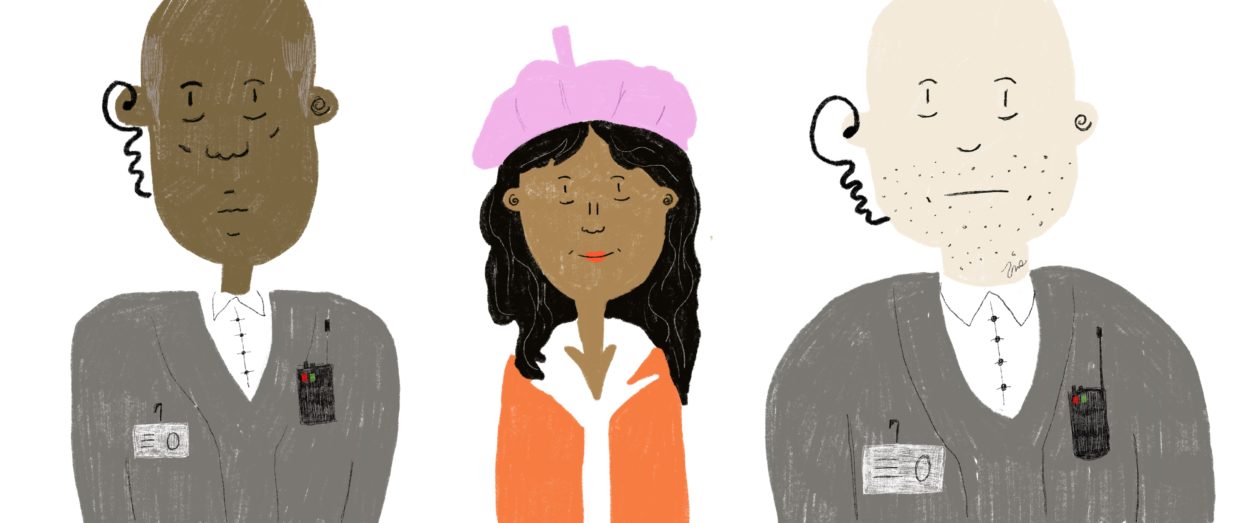On that night I was outside with the bouncers doing bag checks while also keeping an eye on them, as bouncers in general have a reputation for their bias against minority groups. So there I was, nestled in between two large and looming men in black wearing a pink beret and red lipstick. It was a terrifying sight indeed.

Bouncers and Biases
Before I get into the main topic of this article, a huge shout-out deserves to be given to the Clitbait Team and Girls Against for putting on Transcendence. It was inclusive, fun, beautiful and most importantly a safe night where people were free to feel unashamedly happy and dance the night away knowing they were in a secure environment.
While most people had bought their tickets in advance, there were some available on the door, and the majority of people who were at the event were university students or young people (although we didn’t put an age limit on the event and groups of older people showed up and bought tickets too).
There was however one man who came to the queue all alone. He looked fairly old, was dressed in black, didn’t make a lot of eye-contact with me when I was talking to him and spoke quietly. He asked if there were any tickets left on the door, and while I knew there were five left I told him that there weren’t. He left and didn’t come back.
For the rest of the night, and obviously after since I am writing this article, I couldn’t help but think how odd that experience was and feel bad for it. An unimposing brown woman was a bouncer and turned away a middle-aged white man, and he complied. In want of a better word, topsy turvy is the only thing that springs to mind.
Not only was it just straight out uncommon, I also felt terrible because I had made an impulse decision based on very little knowledge of that man. I was thinking to myself, “He’s older than our generation, what if he’s closeted from being part of a generation of even greater LGBTQ+ oppression? What if he was completely harmless, and you’re just as biased as the bouncers in any other club?”
But then I started wondering if other bouncers get this caught up over turning someone away. I highly doubt it. As said earlier, bouncers have a reputation for bias against minority groups, and while some decisions to turn people away are well founded, others are right out racist, homophobic, ableist and misogynistic.
In a study done in Texas, published in Sociology of Race and Ethnicity, three pairs of White, Black and Latino men of similar age, socioeconomic status and dress attended 53 nightclubs. The results found that the Black men were denied entry twice as much as their colleagues.*
While I couldn’t find any academic study of bouncer bias in the UK, personal stories from myself and countless friends, or anyone you ask on the street evidently show it exists here too. Likewise, the recent news of injection spiking in clubs (as if other forms of spiking beforehand were acceptable, for fuck’s sake) obviously shows that clubs are not safe for minorities. While they aren’t the whole problem, bouncers are a big part of the issue seeing they are meant to be the figures of safety and security in this environment.
Bouncers are turning down the wrong people based on gross biases and phobias. They are also not conducting thorough searches, and deny seeing drugs on the perpetrator despite the victim’s word, thus perpetuating explicit rape culture in clubs. And that’s really fucked up. Nightclubs are really fucked up.
Is the solution really that hard? Equality and diversity training needs to be improved, and bouncers need to realise their own biases if they are to make clubs safe spaces. Bouncers also need to be able to shift and modify their behaviour depending on realities and constant feedback, rather than sticking to a single static and archaic code of conduct. Through putting on events like Transcendence and through campaigns like Girls Against, hopefully a more inclusive and dependable bouncer culture can be realised.
*https://thesocietypages.org/socimages/2018/04/29/bouncers-and-bias/
Manvir Dobb, Arts and Culture Editor
Graphic by one of our wonderful graphic designers Peggy Mitchell





Leave a Comment